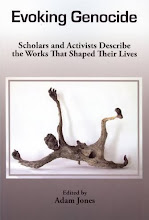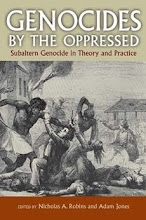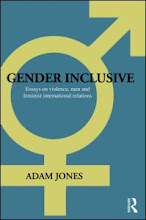 |
| "In this photo taken Jan. 26, 2013, Bawba Mint Baba Ahmed is photographed in Mopti, Mali." (Baba Ahmed/Associated Press) |
Associated Press dispatch in The Washington Post, February 1, 2013
"Bawba Mint Baba Ahmed's sewing teacher singled her out in front of the class, telling her: 'You look like a rebel.' Others threatened to slit her throat, she says, drawing a finger across her neck. Now the 29-year-old has dropped out of school and spends her days hiding inside her mud-walled home with her mother and two sisters, fearing retaliation from those who accuse her of being an Islamist simply because she is Arab. 'We are truly afraid,' she says, tugging at the azure-colored scarf that covers her head and hides her light skin as she sat cross-legged in the shade on a woven mat. 'They say "You're the same color as the ones who have attacked us."' As the French and Malian forces oust al-Qaida-linked militants from the towns of Gao, Timbuktu and Kidal, ethnic tensions exacerbated by months of political upheaval are putting Mali's minorities in danger. Most members of the Islamic groups that took over last year are from Tuareg and Arab ethnic groups. Northerners living in the central and southern parts of Mali say they have faced discrimination and fear of reprisals by those who blame the country's problems on anyone who looks Tuareg or Arab. Less than 15 percent of Mali’s population of some 16 million are Tuareg or Arab, and the vast majority live across northern Mali. Activists also fear that as tens of thousands return home to the north, there may be more such attacks against those suspected of links to Ansar Dine or NMLA -- a secular Tuareg rebel group. 'Given its history and this high level of ethnic tension, we're really concerned that as local populations who suffered tremendously under the NMLA and the Islamists return to their towns and villages in the north that the incidents of reprisals could dramatically increase,' said Corinne Dufka, a senior researcher with Human Rights Watch.
Already in the town of Gao, she said, there have reports that people have targeted the homes of individuals who either housed Islamist fighters or are accused of collaborating with them, notably Arab traders. And in the market of Timbuktu, over a dozen shops owned by the city's Arab population have been gutted, pillaged by the population because the town's Arab citizens were suspected of having been allied with the Islamists. Malian military forces are also facing accusations of targeting Tuaregs and Arabs especially in the last month. International human rights group have expressed concerns about soldiers attacking civilians, including violence directed toward Tuaregs and those suspected of links to the Islamists. One witness told The Associated Press last month that he saw soldiers kill three men in Sevare, including an older man with a beard who had been reading the Quran at a bus stop. [...]"














No comments:
Post a Comment
Please be constructive in your comments. - AJ